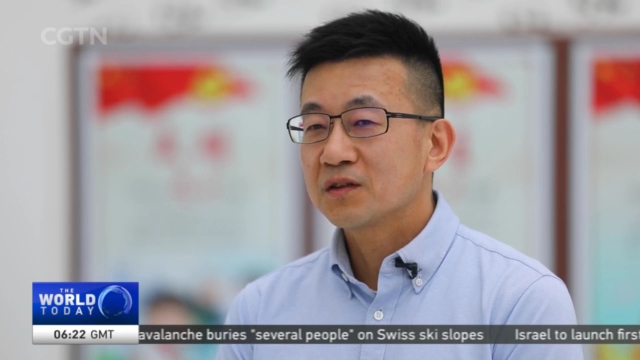
14:58, 20-Feb-2019
Guangdong-Hong Kong-Macao Greater Bay Area: China's Greater Bay Area aims for world innovation center
Updated
14:50, 23-Feb-2019
03:39

The future of China's economy is also being reshaped in the Greater Bay Area region of the country. The goal is to build the region as an innovation center of the world. But how to achieve that goal? Our reporter Ge Yunfei went to Dongguan, a major export manufacturing base in the Bay Area, to find out.
Humans using robotics to perform surgery with minimal invasive procedures that require a single incision or none at all. This cutting-edge technology is a reality, thanks in large part to a Hong Kong medical device start-up company called NISI.
DAVID WONG, FOUNDER & MANAGING DIRECTOR NISI GROUP, HONG KONG "Our product will revolutionize the non-invasive surgeries as well as the medical device market."
Though founded in Hong Kong, NISI chose to set up its manufacturing base in Dongguan, near the new headquarters of Huawei Smartphone. Local officials say start-ups and giants all come here for one reason.
OUYANG NANJIANG, DIRECTOR SONGSHAN LAKE HI-TECH ZONE "In hardware development, our efficiency of updating products is 10 times faster than that of the Silicon Valley, and our cost is only one-tenth of that of the Silicon Valley. This is our biggest advantage in tech development."
China is planning to create a hi-tech innovation center in the Guangdong-Hong Kong-Macao Greater Bay Area. One of the keys is linking Hong Kong's world-class research institutions with the innovation powers and major manufacturing bases on the mainland.
DAVID WONG, FOUNDER & MANAGING DIRECTOR NISI GROUP, HONG KONG "We saw many opportunities arising from the Greater Bay Area. Greater connectivity, support and infrastructure for innovation, these are great visions outlined in the plan which we believe will benefit small businesses and start-ups like NISI."
According to a blue print released this week, Hong Kong will serve as a funding and incubation center for start-ups in the bay area in a move to compete with and model itself after California's Silicon Valley.
LI ZEXIANG, DJI CHAIRMAN FOUNDER OF SONGSHAN INTL. ROBOTIC ZONE "The Silicon Valley's success relies on the many investors and start-up mentors who know how the industry works. So we also need to establish a similar mechanism in our greater bay area."
Twelve years ago, one of Professor Li's students founded drone giant DJI in Hong Kong. The company then moved to Shenzhen to become a world-leading drone maker. Now, a young start-up,e-Propulsion, also created by another of Li's students is on a similar path.
TAO SHIZHENG, CEO E-PROPULSION TECHNOLOGY "In 2013, we found the company in Hong Kong and then finished the development of the core technology. But in 2015, we needed enough space and a developed supply chain to manufacture our products. So we came to Songshan Lake in Dongguan."
According to Tao, the small electric boat motors the company makes are popular in Europe with a 30 percent market share. Li said the success of companies like DJI and ePropulsion builds upon the integration of the region.
LI ZEXIANG, DJI CHAIRMAN FOUNDER OF SONGSHAN INTL. ROBOTIC ZONE "I think they're not just companies of Hong Kong, Shenzhen or Dongguan. They're actually companies of the Greater Bay Area. They integrate each city's advantages to make themselves stronger."
GE YUNFEI DONGGUAN "China's Greater Bay Area aims to build a world innovation center. The key to achieving that goal is the integration and maximization of each Bay Area city's competitive edge. And what's happening here in Dongguan could be a good start. Ge Yunfei, CGTN, Dongguan."

SITEMAP
Copyright © 2018 CGTN. Beijing ICP prepared NO.16065310-3
Copyright © 2018 CGTN. Beijing ICP prepared NO.16065310-3